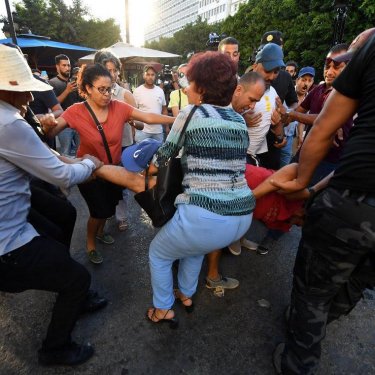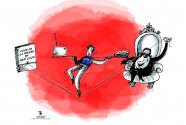Referendum could restore hostile environment for Tunisia’s media

The proposed new constitution that President Kais Saied is putting to a referendum on 25 July, poses a major threat to the progress that press freedom has made during the past decade in Tunisia, Reporters Without Borders (RSF) warns.
“Tunisia’s journalists have made major and exemplary progress in the field of freedom of information since the 2011 revolution, but they now risk paying dearly in a reversal resulting from this referendum,” said Khaled Drareni, RSF’s North Africa representative. “It could endorse a constitution that would permit restrictions on their ability to produce freely reported and impartial information.”
Unveiled by President Saied on 30 June and amended eight days later, the proposed new constitution would restore a presidential system in Tunisia and would in effect perpetuate the situation that has prevailed since parliament’s suspension and then dissolution on 30 March and that of the Superior Judicial Council two months before that.
Although the draft constitution proclaims freedom of the press and information, there are deep reservations certain articles which could undermine effective safeguards for freedoms, especially freedom of expression and press freedom. The Tunisian Association for the Defence of Individual Freedoms said: “Despite recognising certain new rights and freedoms, such as the right of the freedom of the individual (article 26), the draft constitution poses a serious problem as regards the limits it places on rights and freedoms.”
As well as the restrictions placed on rights and freedoms in article 55, there is also concern about independent media regulation and, in particular, about the elimination of the Independent High Authority for Broadcast Communication (HAICA), which has made a major contribution to the protection of press freedom in the broadcast media.
After a great deal of domestic and international criticism, Saied added the words “required by a democratic regime” to article 55. It now says: “No restriction may be made to the rights and freedoms guaranteed by this constitution, except by means of a law and for a necessity required by a democratic regime and with the aim of protecting the rights of others, or for the needs of public security, national defence or public health.”
This addition made no difference to the substance of the constitutional changes, which led RSF to reiterate its call for clear safeguards for fundamental freedoms, including press freedom, without their having to depend on presidential goodwill.
The political context is having a major impact on the referendum. Elected president in 2019, Saied has granted himself full powers since dissolving Tunisia’s parliament last spring, when RSF warned the government about the deterioration in the political environment and its consequences on press freedom.
Pioneering democratic opening
The issue of press freedom in Tunisia is crucial because it was this country that pioneered a democratic opening seen as a model throughout North Africa in 2011. And it was this trailblazing role that led RSF to establish its first regional bureau in Tunis in October of that year.
Since then, the state sector, unions and NGOs have all demonstrated a major commitment to press freedom in the way they have helped Tunisia’s journalists to establish independent media outlets.
With support from the National Union of Tunisian Journalists (SNJT) and other Tunisian associations, trainings and seminars have been organised for journalists. The previous president, Beji Caid Essebsi, participated in the process launched by RSF that led to the creation of the Forum on Information & Democracy with the aim of implementing democratic safeguards in the global information and communication space. Year after year, Tunisia has been seen an example of press freedom to be followed throughout the Arab world.
Tunisian journalism at historic turning-point
Tunisia has unfortunately moved quickly in the opposite direction under Saied, jeopardising all the progress made since 2011. Last January, RSF published a report entitled “Journalism in Tunisia: the moment of truth” that highlighted the danger of a dilution of the Tunisian revolution’s achievements with regard to press freedom. It said journalism in Tunisia was at a historic turning point and warned that Tunisia’s hard-won press freedom was now threatened by the failure to transform the media sector faster during the previous decade, and by recent political developments.
The situation has continued to worsen since the report’s publication, as evidenced by the proposed constitution that is the subject of today’s vote. RSF reiterated its fears three days ago about the road Tunisia could take.
These concerns were underscored on 22 July, when the police used force to disperse demonstrators opposed to the referendum including many journalists. Yousra Chikhaoui, a woman journalist, was slapped by a policeman, while Mehdi Jelassi, the president of the National Union of Tunisian Journalists, had to be treated for the effects of the tear gas that was sprayed in his face. This tension testified both to the government’s determination to impose the referendum and to the way it now intends to treat journalists.

